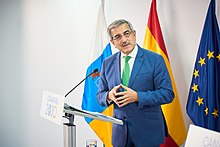
The Canary Islands, also known informally as the Canaries, are a Spanish autonomous community and archipelago in Macaronesia in the Atlantic Ocean. At their closest point to the African mainland, they are 100 kilometres west of Morocco and the Western Sahara. They are the southernmost of the autonomous communities of Spain. The islands have a population of 2.2 million people and are the most populous special territory of the European Union.

The Canarian Coalition is a regionalist, Canarian nationalist political party in Spain operating in the Canary Islands. The party's aim is for greater autonomy for the islands but not independence. It has been labeled as centrist and liberal. The party governed the Canary Islands from 1993 to 2019; and currently since 2023 under Fernando Clavijo Batlle's leadership.
Manuel Antonio Hermoso Rojas is a Canarian politician. He ran for mayor of Santa Cruz de Tenerife from 1979 until 1991 and the fourth president of the Canary Islands Autonomous Region between 1993 and 1999. He represents the Canarian Coalition party and was the first politician ever to bring his party and himself into power in 1993. He was later succeeded after the elections by another Canarian Coalition politician Román Rodríguez Rodríguez in 1999.

Jerónimo Saavedra Acevedo was a Spanish politician and academic. He served as President of the Canary Islands twice, from 1983 to 1987, and again from 1991 to 1993.

Paulino Rivero Baute is a Spanish politician and teacher. A member of the Canarian Coalition, he is the former president of the autonomous community of the Canary Islands.
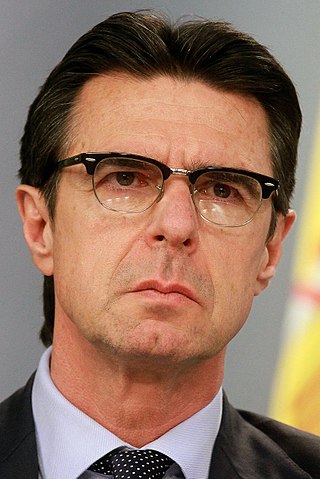
The 2011 Canarian regional election was held on Sunday, 22 May 2011, to elect the 8th Parliament of the Autonomous Community of the Canary Islands. All 60 seats in the Parliament were up for election. The election was held simultaneously with regional elections in twelve other autonomous communities and local elections all throughout Spain.
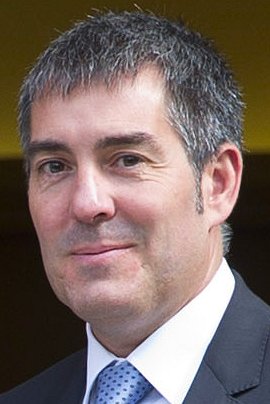
The 2015 Canarian regional election was held on Sunday, 24 May 2015, to elect the 9th Parliament of the Autonomous Community of the Canary Islands. All 60 seats in the Parliament were up for election. The election was held simultaneously with regional elections in twelve other autonomous communities and local elections all throughout Spain.
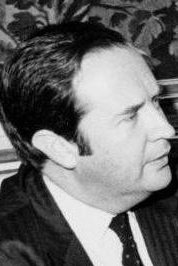
The 1983 Canarian regional election was held on Sunday, 8 May 1983, to elect the 1st Parliament of the Autonomous Community of the Canary Islands. All 60 seats in the Parliament were up for election. The election was held simultaneously with regional elections in twelve other autonomous communities and local elections all throughout Spain.

The 1995 Canarian regional election was held on Sunday, 28 May 1995, to elect the 4th Parliament of the Autonomous Community of the Canary Islands. All 60 seats in the Parliament were up for election. The election was held simultaneously with regional elections in twelve other autonomous communities and local elections all throughout Spain.
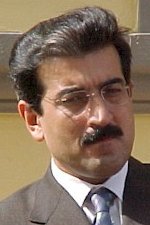
The 1999 Canarian regional election was held on Sunday, 13 June 1999, to elect the 5th Parliament of the Autonomous Community of the Canary Islands. All 60 seats in the Parliament were up for election. The election was held simultaneously with regional elections in twelve other autonomous communities and local elections all throughout Spain, as well as the 1999 European Parliament election.
Canarian Americans are Americans whose ancestors came from the Canary Islands, Spain. They can trace their ancestry to settlers and immigrants who have emigrated since the 16th century to the present-day United States. Most of them are descendants of settlers who immigrated to Spanish colonies in the South of the modern US during the 18th century. The Canarians were among the first settlers of the modern United States; the first Canarians migrated to modern Florida in 1569, and were followed by others coming to La Florida, Texas and Louisiana.

The Canarian Independent Groups were a Spanish political party based in the Canary Islands that existed from 1985 until its integration in Canarian Coalition.
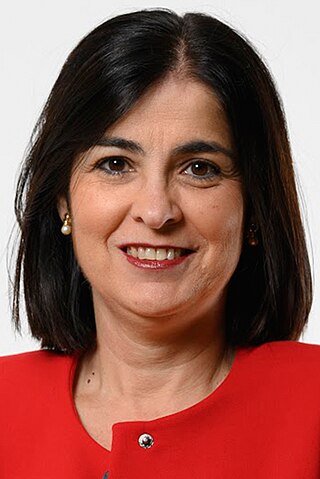
Carolina Darias San Sebastián is a Spanish civil servant and Spanish Socialist Workers' Party (PSOE) politician who served as minister of Health of Spain from 2021 to 2023. Before that, from 2020 to 2021, she served as Minister of Territorial Policy and Civil Service under Prime Minister Pedro Sánchez.
Majorera Assembly is a party in Fuerteventura. It was founded in 1977 as a group of independents by Miguel Cabrera Cabrera, who was elected senator in the 1977 and 1982 general elections.

Fuerteventura is one of the seven constituencies represented in the Parliament of the Canary Islands, the regional legislature of the Autonomous Community of the Canary Islands. The constituency currently elects 8 deputies. Its boundaries correspond to those of the island of Fuerteventura. The electoral system uses the D'Hondt method and a closed-list proportional representation, with a minimum threshold of fifteen percent in the constituency or four percent regionally.

Gran Canaria is one of the seven constituencies represented in the Parliament of the Canary Islands, the regional legislature of the Autonomous Community of the Canary Islands. The constituency currently elects 15 deputies. Its boundaries correspond to those of the island of Gran Canaria. The electoral system uses the D'Hondt method and a closed-list proportional representation, with a minimum threshold of fifteen percent in the constituency or four percent regionally.
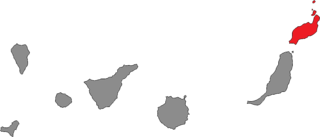
Lanzarote is one of the seven constituencies represented in the Parliament of the Canary Islands, the regional legislature of the Autonomous Community of the Canary Islands. The constituency currently elects 8 deputies. Its boundaries correspond to those of the island of Lanzarote. The electoral system uses the D'Hondt method and a closed-list proportional representation, with a minimum threshold of fifteen percent in the constituency or four percent regionally.

Tenerife is one of the seven constituencies represented in the Parliament of the Canary Islands, the regional legislature of the Autonomous Community of the Canary Islands. The constituency currently elects 15 deputies. Its boundaries correspond to those of the island of Tenerife. The electoral system uses the D'Hondt method and a closed-list proportional representation, with a minimum threshold of fifteen percent in the constituency or four percent regionally.
The Lanzarote Independents Party, formerly the Lanzarote Independents Group, is a political party in Lanzarote.

Ángel Víctor Torres Pérez is a Spanish politician currently serving as minister for Territorial Policy and Democratic Memory since 2023 and secretary-general of the Socialist Party of the Canaries (PSC–PSOE) since 2019. Before that, he served as president of the Canary Islands from 2019 to 2023.
